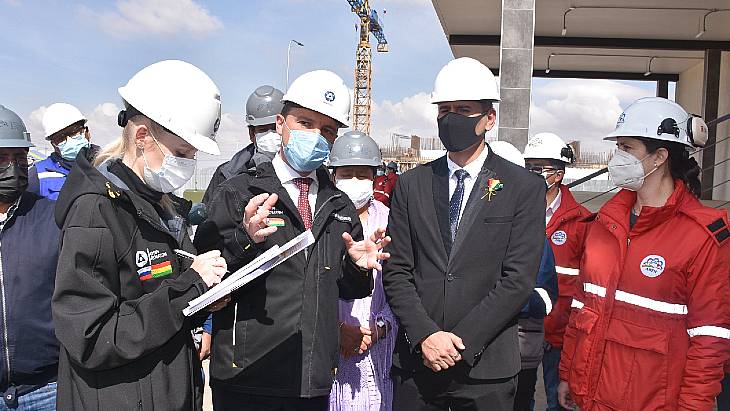The project, being built at El Alto at an altitude of 4000 metres, is a joint one between the Bolivian Nuclear Energy Agency (ABEN) and Rusatom Overseas, part of the Russian nuclear energy giant Rosatom.
The Nuclear Research and Technology Centre will bring together advanced nuclear technologies for healthcare, agriculture and other industries. The first two stages of construction - the CRPC and the MIC - have been completed, with construction and installation work continuing on the third and fourth stages, which include the research reactor complex, due to be commissioned in 2024, and laboratory buildings.
The start-up of the Multipurpose Irradiation Centre promises the genetic improvement of seeds and pest control and will, according to ABEN, help "prolong the shelf life of food, preserve raw materials, exercise phytosanitary control and reduce the volume of losses and waste".
ABEN announced that it would soon be finishing the training of the Bolivian scientists who will be in charge of the operation of both facilities. It said the CRPC was a plant that will produce radioisotopes and radiopharmaceuticals that will later be used for the accurate and safe diagnosis of oncological, cardiac and neurological diseases.
The cyclotron - a particle accelerator - will, according to a Rosatom statement, provide enough radiopharmaceuticals to allow 5000 patients a year in Bolivia to undergo medical examinations using advanced nuclear medicine products without having to travel abroad.
The latest progress update came after Bolivia's Vice Minister of High Energy Technologies, Álvaro Arnez Prado, and the Vice Minister of Energy Development Planning, Mario Alberto Sapiencia Arrieta, carried out a technical inspection of the centre in El Alto to evaluate the progress of the construction works. They were joined by the Senator of El Alto, Virginia Velasco, the Executive Director of the Electricity and Nuclear Technology Control Authority, Eusebio Aruquipa, and the Executive General Director of the Bolivian Nuclear Energy Agency, Hortensia Jiménez, as well as the President of Rosatom Overseas, Evgeny Pakermanov.
During the visit, on 5 August, test irradiation of a batch of medical devices was successfully carried out.
"The built facilities have advanced high-tech equipment and experts from the International Atomic Energy Agency are accompanying this construction process," said Jiménez,
"Together with our Bolivian partners, we have done a great job in the cyclotron complex to train Bolivian students, who are in the final stage of training, to produce fluoroglucose, a very important radiopharmaceutical for the diagnosis of oncological diseases. As soon as all the tests are completed and the necessary licences are obtained, the CRPC will start supplying radiopharmaceuticals to Bolivian medical centres," said Pakermanov.
"Bolivia is on the way to being one of the most important countries in Latin America in the use of nuclear technology," he added.
Last year Pakermanov told World Nuclear News that due to its "unique location, the Bolivian CNTRD will certainly become a landmark for the entire global nuclear industry".







_97013.jpg)
_51413.jpg)






